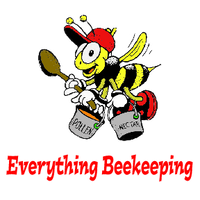The Sweet Science of Preservation: Honey as Nature's Food Guardian!
Posted by Wayne Flewelling on
🍯🌿 The Sweet Science of Preservation: Honey as Nature's Food Guardian! 🌿🍯
Hello, food enthusiasts and curious minds! 🌼🏞️ Today, we embark on a journey to explore the remarkable role of honey as a natural food preservative, a timeless technique that our ancestors relied upon to safeguard the flavors of their harvests. Let's delve into the fascinating science behind honey's preservative power and its journey from the beehive to the kitchen pantry! 🐝🍯
🌿 The Magic of Low Moisture:
At the heart of honey's food-preserving prowess lies its low moisture content. As bees collect nectar from flowers, they transform it into honey through enzymatic processes. The bees then fan their wings to evaporate excess water, reducing the honey's moisture to around 17-18%. This low water content inhibits the growth of microorganisms, including bacteria and yeast, that would typically cause food spoilage.
🍃 A Natural Antimicrobial Agent:
Honey is more than just a sweetener; it's a natural antimicrobial agent! Its unique composition includes glucose oxidase, an enzyme that produces hydrogen peroxide when honey comes into contact with water or a wound. This gentle yet effective antimicrobial action makes honey an excellent choice for preserving food and even treating minor wounds and burns.
🌸 Preserving Through Osmosis:
Another fascinating aspect of honey's preservation power is its hygroscopic nature. Honey has the ability to draw moisture from its surroundings, including food items, through a process called osmosis. This dehydrating effect prevents microorganisms from thriving in the food, effectively preserving it for extended periods.
🍯 An Ancient Preservation Technique:
The use of honey as a food preservative dates back centuries, with historical records and archaeological findings attesting to its efficacy. Ancient civilizations, such as the Egyptians and Greeks, treasured honey for its ability to keep their food fresh and edible for long durations.
🏞️ Modern Applications:
Even in the modern era, honey remains a valuable natural food preservative. It is used in various culinary applications, from baking to marinades and dressings, to extend the shelf life of foods. Its natural sweetness enhances flavors, making it a delightful and healthier alternative to processed sugars.
🌟 As we marvel at the science of preservation behind honey, let's embrace this timeless culinary ally in our kitchens. By harnessing the sweet magic of honey, we not only savor the delectable taste of preserved foods but also pay homage to the wisdom of our ancestors, who recognized the gift of honey as nature's guardian of freshness! 🍯🌿🐝
#HoneyPreservative #NaturalFoodGuardian #TimelessWisdom #BeekeepingMagic #GoldenGoodness #EverythingBeekeeping 🌟🍯🐝
Hello, food enthusiasts and curious minds! 🌼🏞️ Today, we embark on a journey to explore the remarkable role of honey as a natural food preservative, a timeless technique that our ancestors relied upon to safeguard the flavors of their harvests. Let's delve into the fascinating science behind honey's preservative power and its journey from the beehive to the kitchen pantry! 🐝🍯
🌿 The Magic of Low Moisture:
At the heart of honey's food-preserving prowess lies its low moisture content. As bees collect nectar from flowers, they transform it into honey through enzymatic processes. The bees then fan their wings to evaporate excess water, reducing the honey's moisture to around 17-18%. This low water content inhibits the growth of microorganisms, including bacteria and yeast, that would typically cause food spoilage.
🍃 A Natural Antimicrobial Agent:
Honey is more than just a sweetener; it's a natural antimicrobial agent! Its unique composition includes glucose oxidase, an enzyme that produces hydrogen peroxide when honey comes into contact with water or a wound. This gentle yet effective antimicrobial action makes honey an excellent choice for preserving food and even treating minor wounds and burns.
🌸 Preserving Through Osmosis:
Another fascinating aspect of honey's preservation power is its hygroscopic nature. Honey has the ability to draw moisture from its surroundings, including food items, through a process called osmosis. This dehydrating effect prevents microorganisms from thriving in the food, effectively preserving it for extended periods.
🍯 An Ancient Preservation Technique:
The use of honey as a food preservative dates back centuries, with historical records and archaeological findings attesting to its efficacy. Ancient civilizations, such as the Egyptians and Greeks, treasured honey for its ability to keep their food fresh and edible for long durations.
🏞️ Modern Applications:
Even in the modern era, honey remains a valuable natural food preservative. It is used in various culinary applications, from baking to marinades and dressings, to extend the shelf life of foods. Its natural sweetness enhances flavors, making it a delightful and healthier alternative to processed sugars.
🌟 As we marvel at the science of preservation behind honey, let's embrace this timeless culinary ally in our kitchens. By harnessing the sweet magic of honey, we not only savor the delectable taste of preserved foods but also pay homage to the wisdom of our ancestors, who recognized the gift of honey as nature's guardian of freshness! 🍯🌿🐝
#HoneyPreservative #NaturalFoodGuardian #TimelessWisdom #BeekeepingMagic #GoldenGoodness #EverythingBeekeeping 🌟🍯🐝
